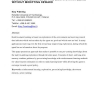109 search results - page 2 / 22 » Policy teaching through reward function learning |
ICRA
2009
IEEE
13 years 11 months ago
2009
IEEE
Abstract— Least-squares policy iteration is a useful reinforcement learning method in robotics due to its computational efficiency. However, it tends to be sensitive to outliers...
IJCAI
2001
13 years 5 months ago
2001
Most formulations of Reinforcement Learning depend on a single reinforcement reward value to guide the search for the optimal policy solution. If observation of this reward is rar...
ROMAN
2007
IEEE
13 years 10 months ago
2007
IEEE
—This paper proposes a novel method of learning a users preferred reward modalities for human-robot interaction through solving a cooperative training task. A learning algorithm ...
NN
2007
Springer
13 years 3 months ago
2007
Springer
Reinforcement learning is based on exploration of the environment and receiving reward that indicates which actions taken by the agent are good and which ones are bad. In many app...
ICML
2004
IEEE
14 years 5 months ago
2004
IEEE
We consider learning in a Markov decision process where we are not explicitly given a reward function, but where instead we can observe an expert demonstrating the task that we wa...

